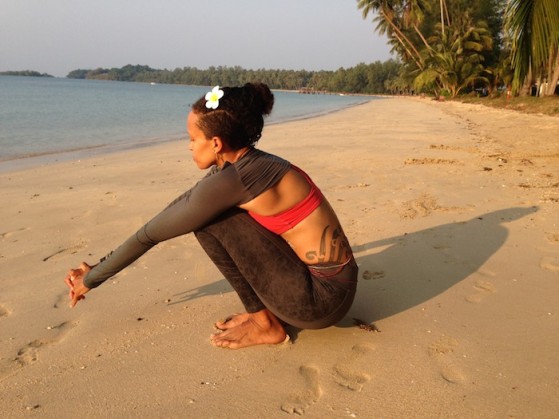An Interview With KISMET Sustainable Yoga Wear Femmepreneur, Sylvia Daun.
 It brings me much happiness to conduct this interview with Sylvia Daun, German yogini based in London and the visionary behind the new ethically and sustainably sourced Yoga wear line KISMET yogastyle.
It brings me much happiness to conduct this interview with Sylvia Daun, German yogini based in London and the visionary behind the new ethically and sustainably sourced Yoga wear line KISMET yogastyle.
As a yoga practitioner (and general human being) trying to live consciously and with greater awareness about our impact on this modern world, I feel humbled to be able to play a small part in getting the word out about this femmepreneur.
Sylvia and her line of sustainably produced Yoga wear is in the same massive arena as the global athleisure and performance wear giants, and putting yogic principles into practice by working in the field of sustainable fashion and alternate textile production.
Hers is a brand I can support with a clear conscience since our mutual worldviews of fairer wages and environmentally sound practices within the field of eco-fashion are well aligned.
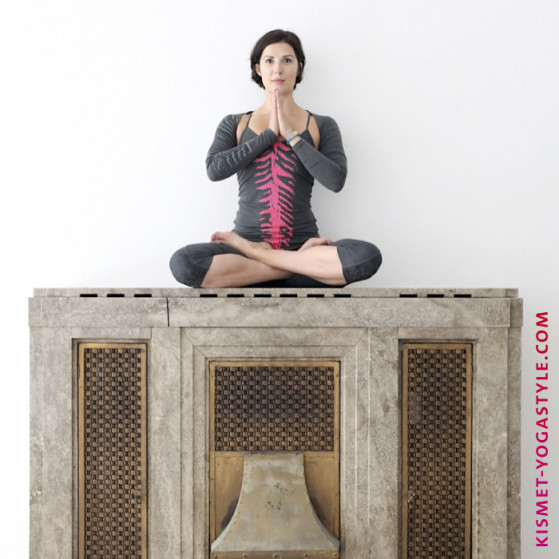
Why don’t we begin with you telling us a little about yourself and your experience with Yoga?
I started with Yoga about eight years ago because I had gained some weight which I wanted to lose. It seems like quite a superficial reason, but as I got more into it, I felt that it became much more than just a physical workout. I became more conscious about the breath and that made me more conscious and reflective about myself and my life.
I felt that I needed to make some changes. I had quite a demanding job for which I needed to travel a lot. This meant catching early morning flights, having meetings all day and then getting back on the plane at night.
These were stressful fast-paced unhealthy-eating days, and on the weekends, I usually felt so shattered and drained that I would stay at home and try to recover by just vegging out. When I started up with Yoga, I made some positive lifestyle changes, like giving up smoking and bringing my own food with me on business trips.
In my free time, I took up Ayurvedic cooking and attended Yoga workshops. I became curious about Yoga philosophy and wanted to learn more. Several trips to India followed, which were all amazing experiences!
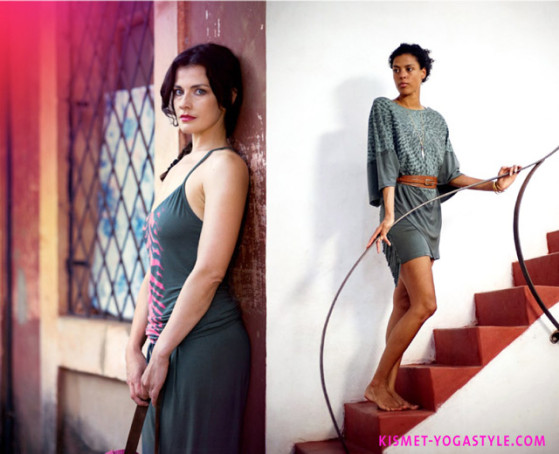
What was the idea behind your brand?
In a nutshell, the idea behind the collection is to create comfortable and fashionable performance and athleisure wear. As a modern woman, I always loved fashion but found that the Yoga clothes available in the market were too much related to sportswear and were not interesting enough for my taste.
From conversations with other like-minded practitioners, many told me they felt the same; so the idea to create a Yoga fashion collection came to my mind. At first, I did not take it too seriously because I’m not a designer by trade nor do I have a textile background.
However, I kept dreaming and imagining how it would be to start creating Yoga clothes, and the idea started to grow more and more in my mind until I felt the urge to at least give it a try.
My job was so time and energy consuming that it wasn’t possible to do much else on the side, so I quit my job and started traveling to get out of my every day life and discover new opportunities. I went to India, Thailand, Brazil and continued practicing Yoga and studying philosophy. I also began writing my business plan.
The more I focused on my idea, the more I would coincidentally meet the right people who inspired me with design ideas, put me in touch with manufacturers, and helped sharpen my strategy, which was to create a lifestyle collection that’s wearable 24/7.
Yoga is a lifestyle which doesn’t end after class or when you are off the mat, so these garments would need to be an integral part of this lifestyle. And in keeping with the insights gained from studying Yoga philosophy, an essential aspect of this line meant that that it would need to be sustainably and ethically produced.
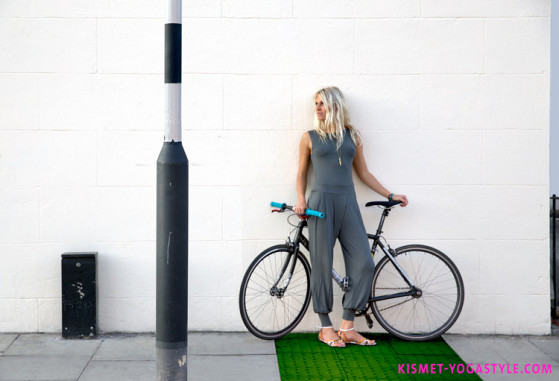
The material you use is incredibly soft and exceptional quality. Can you tell us what it is, what it is made from and how it is sustainable for the environment?
We produce in Portugal and Turkey with GOTS-certified companies and fair conditions for workers. The fabric we use is mainly modal which is made from beechwood, of which more than half are sourced locally from Austria and the remainder are from neighboring countries.
Furthermore, these beech trees multiply by a process called rejuvenation, meaning that no artificial irrigation or planting is required. In this way, the beechwood forests are a completely natural and sustainable source of raw material.
The yarn is produced by an Austrian company called Lenzing, and they have developed a CO2-neutral process for production. This standard covers the processing, manufacturing, packaging, labeling, trading and distribution of all textiles made from at least 70% certified organic natural fiber.
Even pulp production at Lenzing is self-sufficient in terms of energy and is an important supplier of energy for the entire operation. Lenzing is a pioneer when it comes to wood refineries and up to 95% of the production materials are recovered as a result of innovative environmental processes.
What’s more, this gentle treatment is what makes it possible for the Lenzing Modal® production site to be located in the middle of a tourist area!
What is the inspiration behind your designs?
Nature and cultural patterns from around the globe. The first collection was inspired by Moroccan prints and animal skin.
What are the biggest challenges you have come up against in terms of being a sustainable and ethically sourced fashion line?
The first problem is to source a supplier who produces smaller amounts for a small company (especially for recycled polyester, the minimums are usually very high and in fact there are not that many suppliers).
The second problem would be that sustainably and ethically sourced production is much more expensive, so consumers have to be willing to pay more for a sustainable and fairly produced product.
It involves a change of thinking: going from exploitative, thoughtless, greedy fast fashion, where clothes are produced cheaply and consumed at a staggeringly high rate, to viewing clothes as investment pieces, which cost more, sure, but are of a higher quality and built to last longer.
What advice would you give to other women who aspire to own and run a small business of their own?
You need to have a good concept, extremely thorough preparation, a proper business plan, and financial backup for one year. Finally you have to trust in yourself and just do it! 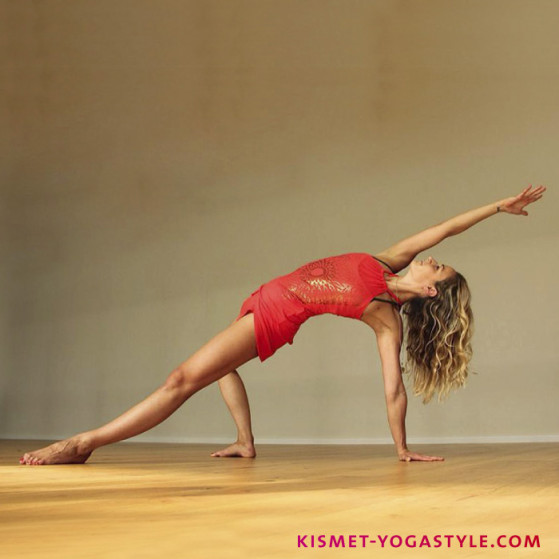
How do you imagine the near to mid-future for you? How about further along down the line?
Kismet shall become an international brand for green and fair-produced Yoga fashion and Yoga lifestyle products. In terms of the company, I want to apply and spread yYoga values into business as Yoga is one of the best things which has ever happened to me.
My values are to inspire and to support one another: to collaborate instead of compete; to produce my line using environmental friendly processes and to provide fair wages. I wish to create products which make people feel comfortable and beautiful and which are durable and of high quality.
How about this idea you had about doing something with designers in Kenya?
I would like to set up a project which involves Yoga bag production in India and the African continent. This would be further down the line but I feel deeply committed to this idea.
While I was traveling, I realized that many women don’t have the chance to survive economically without being married. I think every woman in the world should have the chance to live a free and independent life without being forced into marriage, possibly with somebody who might not treat them well or who could even abuse them.
What’s more, when people produce something which others respond to successfully, they gain not just money but self-confidence as well, not to mention new ways and opportunities for self-sustaining their local economy.
In India, as well as in Kenya, Nigeria, Mali and South Africa, to name a few, there are traditional designs and techniques which are very unique and beautiful, of which I’m sure there would be a big demand in Europe, USA, Canada… for colorful, vibrantly patterned Yoga bags.
What is the significance of the word kismet? What’s the story behind the name?
So the word kismet, which my father explained to me very nicely, became the company name. Kismet means lucky destiny and my father always taught me to trust in life and that things will magically fall into place. This doesn’t mean that things will be easy and effortless; rather, you have to trust in yourself and in life and work hard as well.
